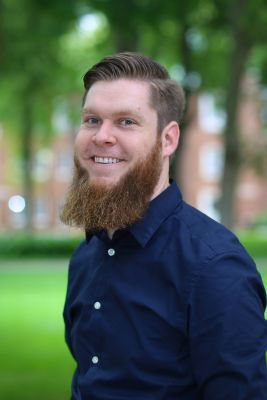New U.S. history professor brings religious and national ‘outsider’ perspective to role

The first time that Philipp Gollner recalls encountering American history was as a child in Austria. He was watching a German translation of the “Simpsons” TV show when a news broadcast of the September 11 attack in New York City interrupted the program. Gollner began to see national American headlines using religious language, which he found “puzzling” — from the very beginning, his experience of American history was tied to religion.
Gollner will bring his interests in religion, migration, space, race and ethnicity to Goshen College this fall as a new assistant professor of U.S. history. An Austrian native, Gollner moved to the United States in 2006.
Gollner grew up Catholic and encountered Mennonites for the first time in the United States, although his academic interest in Mennonites as a historically “fringe” denomination came before he ever attended a Mennonite church himself.
“I think I naturally gravitate to faith stories that are a little gritty, that don’t always flow easily with the jargon of American and Western religion at the time,” he said. “Over the years, the Anabaptist tradition has shown a lot of that grit.”
This academic interest soon developed into a more personal investment.
“I had a brief and shiny theological ‘eureka!’ moment while encountering Mennonites,” he said. “Having left the state church in my country, I was still figuring out what it meant to be a free church, especially in a context so different from my upbringing. Joining a multiracial Mennonite church helped me on my own faith journey, but also forced me to integrate learning history with the messy task of living in a historic community in the present.”
Gollner admitted that before he first began attending a Mennonite church — Community Mennonite Church in Markham, Illinois — he did a little bit of preparation.
“I did download and listen to quite a few Goshen College chapel podcasts to familiarize myself with the hymnal,” he said. “I made myself learn to sing. I know that sounds like a cliché, but to learn to sing along, to get on the same page with others — that’s been a lesson from finding the Mennonites that I hope plays out well in my academic life and in my vocation as a teacher.”
Gollner is eager to continue his own academic development at GC and plans to add Spanish to the list of six languages that he can already speak or read. His first language is German, but he learned English, Latin and French in high school, taught himself Swedish from a book during his year of mandatory service in the Austrian military and has proficiency in Norwegian and Koine Greek as well.
“Where I grew up, you drive [anywhere] and you’re going to have to speak different languages,” he said. “I’ve always had the sense that learning languages was the key to opening up different cultures.”
Gollner recently completed his dissertation, titled “Good White Christians: How Religious Immigrants Shaped Race, Ethnicity and Privilege in America,” at the University of Notre Dame.
“The project as a whole does for various ethnic-religious groups what I intend to do [at Goshen College] for Mennonites as well — turn these stories outward a little bit, put them in comparative perspective with other stories and see what that particular story can contribute to American history and American religion at large,” he said.
– By Grace Weaver ’16




